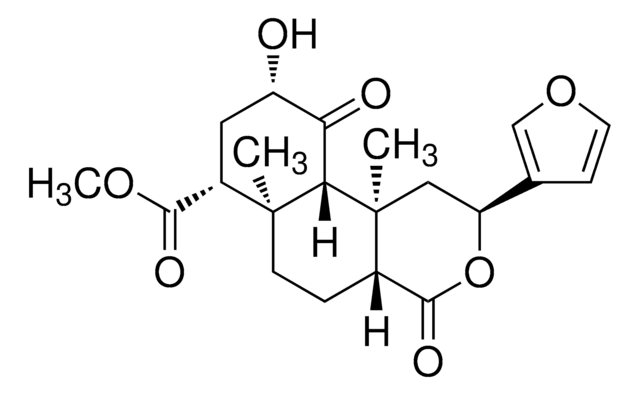SML2304
Clozapine N-oxide hydrochloride
≥98% (HPLC), powder, muscarinic DREADD activator
Sinónimos:
Clozapine N-oxide hydrochloride, 8-Chloro-11-(4-methyl-1-piperazinyl)-5H-dibenzo[b,e](1,4)diazepine N-oxide, hydrochloride salt
About This Item
Productos recomendados
product name
Clozapine N-oxide hydrochloride, ≥98% (HPLC), Water soluble Clozapine N-oxide
biological source
synthetic
assay
≥98% (HPLC)
form
powder
storage condition
desiccated
solubility
DMSO: 40 mg/mL
water: 40 mg/mL
shipped in
ambient
storage temp.
2-8°C
SMILES string
ClC1=CC2=C(NC(C=CC=C3)=C3C(N4CC[N+]([O-])(C)CC4)=N2)C=C1.[xHCl]
InChI
1S/C18H19ClN4O/c1-23(24)10-8-22(9-11-23)18-14-4-2-3-5-15(14)20-16-7-6-13(19)12-17(16)21-18/h2-7,12,20H,8-11H2,1H3
InChI key
OGUCZBIQSYYWEF-UHFFFAOYSA-N
General description
The selective targeting of DREADD systems to cell population can be achieved by using a cell type-specific promoter to drive DREADD expression, and the expression of this promoter can be further controlled using a recombinase-based system. DREADDs possess a low affinity for endogenous ligands and little constitutive activity, but may be activated by synthetic compounds such as CNO.
DREADD systems are activated by low nM concentrations of CNO and mobilize intracellular calcium. CNO appears to be pharmacologically and behaviorally inert in mice and rats when administered at the recommended doses (generally 0.1–3 mg/kg). CNO is commonly administrated via injection but also can be mixed into food chow or drinking water.
Other Notes
signalword
Danger
hcodes
Hazard Classifications
Acute Tox. 3 Oral - STOT SE 3
target_organs
Central nervous system
Storage Class
6.1C - Combustible acute toxic Cat.3 / toxic compounds or compounds which causing chronic effects
wgk_germany
WGK 3
flash_point_f
Not applicable
flash_point_c
Not applicable
Certificados de análisis (COA)
Busque Certificados de análisis (COA) introduciendo el número de lote del producto. Los números de lote se encuentran en la etiqueta del producto después de las palabras «Lot» o «Batch»
¿Ya tiene este producto?
Encuentre la documentación para los productos que ha comprado recientemente en la Biblioteca de documentos.
Nuestro equipo de científicos tiene experiencia en todas las áreas de investigación: Ciencias de la vida, Ciencia de los materiales, Síntesis química, Cromatografía, Analítica y muchas otras.
Póngase en contacto con el Servicio técnico








